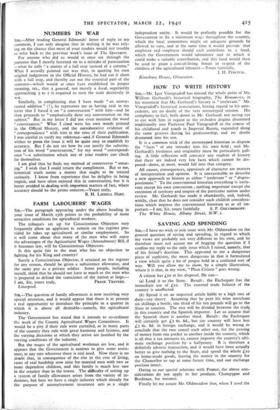FARM LABOURERS' WAGES SIR, —The paragraph appearing under the above heading
in your issue of March 15th points to the probability of more attractive conditions for agricultural workers.
The tribunals set up for Conscientious Objectors very frequently allow an applicant to remain on the register pro- vided he takes up agricultural or similar employment. So it will come about that many of the men who will enjoy the advantages of the Agricultural Wages (Amendment) Bill, if it becomes law, will be Conscientious Objectors.
Is this quite fair to the man who has no objection to fighting for his King and country?
Surely a Conscientious Objector, if retained on the register for any reason, should be given a subsistence allowance, and the same pay as a private soldier. Some people, including myself, think that he should not have as much as the man who is prepared to defend the conscience of the nation at large.— Stu,—The question of family allowances is now receiving very special attention, and it would appear that there is at present a real opportunity to introduce the principle in a quarter in which it is above all desirable—namely, the agricultural industry.
The Government has stated that it intends to co-ordinate the work of the County Agricultural Wages Committees. It would be a pity if their rule were curtailed, as in many parts of the country they rule with great harmony and fairness, and the varying decisions at which they arrive are justified by the varying conditions of the industry.
But the wages of the agricultural workman are low, and it appears that the Government is anxious to give some assist- ance, at any rate wherever there is real need. Now there is no doubt that, in consequence of the rise in the cost of living, cases of real hardship now arise for married men with two or more dependent children, and this family is much less rare in the country than in the towns. The difficulty of setting up a system of family allowances arises from the variety of in- dustries, but here we have a single industry which already for the purpose of unemployment insurance acts as a single
independent entity. It would be perfectly possible for the Government to fix a minimum wage throughout the country, which the local committees might on adequate grounds be allowed to vary, and at the same time it would provide that employer and employee should each contribute to a fund, which the Government would administer and to which it could make a suitable contribution, and this fund would then be used to grant a cost-of-living bonus in respect of the children of the agricultural labourer.—Yours faithfully, J. H. PERCIVAL. Kimsbury House, Gloucester.






































 Previous page
Previous page